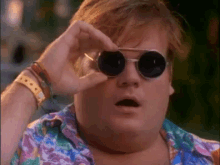The Luminist is a reader-supported publication that illuminates the pain, the pleasure, and the paradox on the path to technicolor living. Subscribe below to receive posts about how loss teaches us to get the most out of life (along with silly gifs) in your inbox every Saturday.
The incoming text from my pal Todd flashed on screen.
“Here’s a link to Angie’s bio. See you later tonight.”
A cut-off portion of Angie’s LinkedIn header appeared on my phone screen:
IMPRESSIVE BIG WIG
IVY LEAGUE CORPORATE SMARTY PANTS
ULTRA ACCOMPLISHED HUMAN BEING
Well… it didn’t literally say that. My mind just read it that way.
Todd thought he was doing me a favor, sending me a pre-read so I could know more about this person I was soon to meet.
But our meeting was not a job interview. Not a sales call. Not a probing expose on all things Angie. It was just two new people being connected by a mutual friend, no outcome intended.
As the clipped text stared me in the face, I had a choice.
To click or not to click? That was the question.
We love to be prepared.
Even for the smallest of interactions, such as a cocktail with a friend of a friend. We’d prefer their dossier and a six-part HBO documentary on their lives before we engage with them personally. That way we can be ‘ready’.
Ready for what?
Who knows! That’s why we have to check!
So we dig around, we google, we ask friends. Then we form an image of the new person (or experience or idea or candidate or cuisine, etc) out of the information gathered — a Frankenstein built from our expectations.
Sure, this fabrication has the characteristics of the real thing, but its forehead is too wide, fingers too skeletal, and there are all those weird screws in its neck. In other words, it doesn't represent reality. What this expectation Frankenstein mostly does is scare us, bias us, keep us wary and one step removed when the real thing comes into our orbit.
It makes me think of the phrase ‘prepare for the worst and hope for the best’.
I lived by this philosophy for many years. But I’ve started to wonder, how often is our “preparation" actually setting ourselves up to experience the worst?
Around a decade ago, I worked at a multinational corporation.
We were adding a new Australian teammate: Michael Dixon.
“Michael Dixon is joining our team? Oh no, he’s terrible!” said a colleague.
”What kind of terrible?” I asked, filled with dread.
”Arrogant, selfish, harsh. He thinks he’s always right.” He replied.
Oh damn. Forming cohesive teams is hard enough. Forming teams with jerks is even harder.
Then I got a call from Michael himself.
“Hi there, Sue, I wanted to introduce myself and chat about the team, the best way to support our boss, and to get to know you a bit. I’m really looking forward to joining.”
Well, wait. He wasn’t supposed to be nice. He was supposed to be awful.
Yes, he was brusque in an Aussie’s way, and salty, but also straightforward, smart, and supportive. What was not to like? I fell in (professional) love with him.
I’d made an expectation Frankenstein out of Michael in my head. If I’d stuck to that monstrous creation rather than letting our actual interactions define my opinion of him, I’d have lost out on one of the deepest friendships of my life, not to mention negatively impacting the team.
I have used this story at least a thousand times in speaking to new leaders, mentoring staff, trying to get the kids to open their minds to something new. In fact at home we call it the ‘Michael Dixon rule’. No expectation Frankensteins allowed. Experience someone, something, some place new for yourself, not through the lens of others.
There are some things it’s really important to be prepared for.
A hurricane, a job interview, a flat tire. But we’ve taken that philosophy of “better safe than sorry!” and over-applied it.
More information does not always lead to a better outcome.
Observation bias refers to humans’ tendency to see what we expect to see, experience what we expect to experience. In this way, expectations put blinders on our vision, affect the options we notice and the paths we take, and make our lives a little bit smaller. Potentials, like the surreal and incredible turns my life has taken since my husband died, become less likely.
When we have no idea what’s about to happen, we pay more attention. We’re curious and open-minded. We spot little details we’d write off as unimportant if we were sure how this experience was going to play out.
And we’re more likely to notice that unexpected opportunity that just waltzed by before it slips out the back door.
I met Angie without ever opening her bio.
I decided to let the woman herself teach me who she was, rather than her LinkedIn profile.
Because if everyone I met had already formed a preconceived notion about me as a widow, they’d treat me differently. Maybe they’d treat me like a hurricane — “rain and lightning incoming!” — or a flat tire — '“not my favorite way to spend an hour, but I guess I have no choice…”
But I’m a freaking ray of sunshine.
So I didn’t let myself put Angie in a single box. I let myself be surprised and titillated as I learned about her life, realized we have an identical sense of humor, and discovered we both know Michael Dixon!! (Lol, just kidding.)
But you just never know.
So don’t destroy your curiosity by creating an expectation Frankenstein and thinking you’ve got it all figured out.
Unprepared,










Wonderful! And definitely needed.
Ann